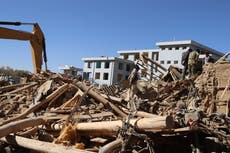Afghanistan’s peace talks are set to fail if women are not included
Evidence from fragile peace negotiations in many other diverse conflicts shows us why women are so crucial to long-lasting peace

After four decades of devastating conflict, the Taliban and Afghan government formally meeting for the first time appeared to be a landmark moment.
Many in the international community had high hopes for the peace talks in Doha, which follow the agreement between the US and the Taliban in February to end a near 20-year war. The negotiations then offered an opportunity to cement and further the inclusion of women in all aspects of Afghan life.
But the last week has seen fierce clashes between the Taliban and Afghan government forces in Helmand, with reports of dozens of casualties. While renewed fighting risks jeopardising the peace talks, there is another fundamental concern: the talks are failing to include women.
Speaking to my colleagues and people throughout the country, there is genuine fear from women and the Afghan people that any expected peace deal could undo the progress already made over the last two decades to protect women’s rights.
Evidence from fragile peace negotiations in many other diverse conflicts shows us why women are so crucial to long-lasting peace.
Studies have shown that the participation of civil society groups, including women’s organisations, makes a peace agreement 64 per cent less likely to fail. And a peace deal is 35 per cent more likely to last 15 years if women are included.
The issue is of such critical importance in Afghanistan that last month dozens of world leaders signed an open letter calling on women to participate in the current talks.
With women’s participation in peacebuilding so critical, it’s concerning that the talks are excluding women in three ways.
Firstly, Afghan women are not being offered a seat at the negotiating table. With just four women in the Afghan government's 21-member team, and none on the Taliban’s side, women are largely excluded from participating in the formal negotiations.
This lack of representation is not due to a shortage of strong, experienced female candidates. My own experience shows that women in Afghanistan have played an integral role in wider peace efforts, from mediating in their local communities to formal roles in challenging negotiations with the Taliban. As an example, from 2010 to 2012 I worked with women who brokered talks between the government and groups of armed insurgents.
Inclusion begins by supporting women to fully participate in peacebuilding discussions, where they can freely share their valid perspectives.
Secondly, the agenda for these first round of talks, which will lay the foundations for future decisions, risks having a profound impact on women’s rights.
The Taliban’s interpretation of the rights of women in Islam largely deviates from the interpretation of many Afghans, who believe in equal rights of women and men in the light of Islamic teachings.
Many women fear the talks could result in changes to the country’s constitution, which is the main protector of their rights. Although the Taliban have indicated they will allow girls to be educated, women to work and to participate in the county’s cabinet, questions remain around what conditions will have to be agreed to, and women’s autonomy in decision-making. Will women be promoted into ultimate positions of power, including the judiciary or as head of state?
While there is a strong determination among women’s groups, activists and the Afghan government to protect the gains made so far, progress will require a concerted effort from the whole negotiating team – not just the women. Women’s rights must be put at the heart of the talks as a whole, not as a last item on a lengthy agenda.
Thirdly, there is a real fear that the current exclusion of women from formal negotiations will set a course towards further marginalisation in the future.
Afghan women are crucial to long-lasting peace. They must be engaged in rebuilding the country, in implementing and monitoring any settlement that is agreed, and in reintegration and reconciliation efforts. Women must fully participate in Afghanistan’s social, political and economic affairs – protecting this is the duty of all parties.
This first stage of peace talks may have so far failed to put half of the Afghan population in the picture, but it is never too late to include women.
As negotiations continue in Doha, those who have influence over the two teams – whether international governments, NGOs or activists – have a once-in-a-generation opportunity to drive forward women’s rights, women’s equal participation in society and in the future re-building of their country.
By working with Afghan women in the design of financial and political support to the country, and in educating male negotiators on both sides, the international community can leverage change now, and into the future.
Quhramaana Kakar is a senior strategic adviser at peacebuilding NGO Conciliation Resources and leads Women Mediators across the Commonwealth, a network they host that supports 50 female mediators worldwide
Join our commenting forum
Join thought-provoking conversations, follow other Independent readers and see their replies
Comments




Bookmark popover
Removed from bookmarks